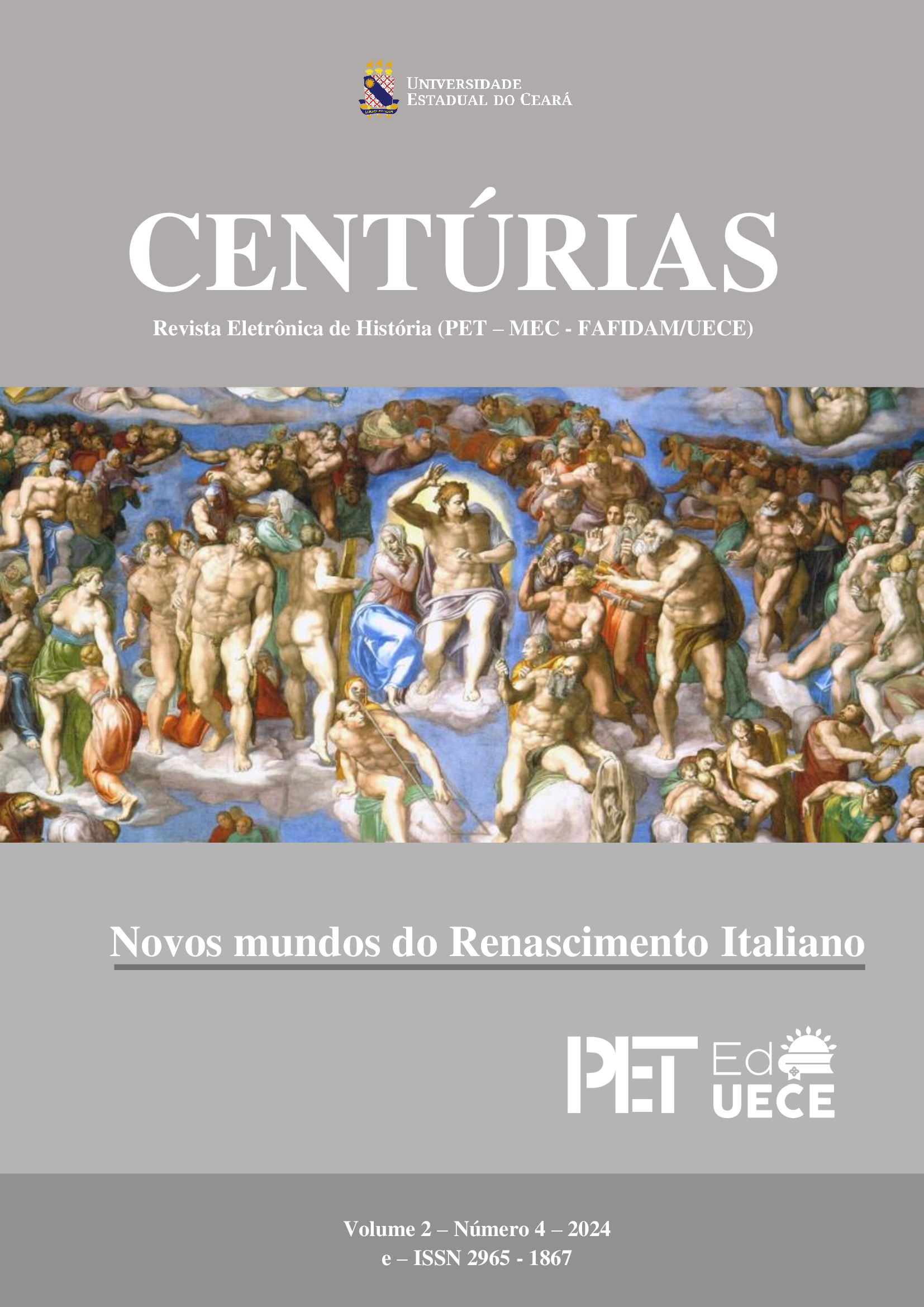The The Militia by Leonardo Bruni
DOI:
https://doi.org/10.52521/rc.v2i4.13132Keywords:
Leonardo BruniAbstract
Completed in December 1421, De Militia represents the highest expression of the thought of the Florentine humanist and chancellor, Leonardo Bruni, in the social and political field, before the writing of Historiae florentini popoli. This important work of Renaissance political thought is distinguished by the lack of rhetorical and encomiastic emphasis that permeates Bruni's previous works, such as Laudatio and Oratio. In De Militia, the humanist deals with the historical characteristics of the army, analyzing them based on four central topics: 1) The historical and philosophical origin of the militia; 2) The connections between the modern Florentine militia and the militias of past times; 3) The reputation of the soldier, his clothing and ornaments and 4) The position and conduct of the soldier not only in times of war but also in times of peace. Still without translation into Portuguese, this article translates the work in its entirety, inserting explanatory notes to the text and a brief presentation of the work.
References
ARISTOTELE. Politica. A cura di Carlo Augusto Viano. Milano: BUR Classici greci e latini, 2017.
BAILEY, Charles Calvert. War and Society in Renaissance Florence: De Militia of Leonardo Bruni. University of Toronto Press. 1961.
BARON, Hans From Petrarch to Bruni, studies in humanist and political literature. Chicago: University of Chicago Press, 1968.
BARON, Hans. Search of Florentine civic humanism. Princeton University Press, 1989.
BARON, Hans. The crisis of the early Italian Renaissance. Princeton University Press, 1955.
BERNARD-PRADELLE, L. Lettres Familières. Tome 1 et 2. Presses Universitaires de la Méditerranée, 2014.
BIGNOTTO, Newton.(org.) Matrizes do Republicanismo. Belo Horizonte: Editora UFMG, 2013.
BIGNOTTO, Newton. Origens do Republicanismo Moderno. Belo Horizonte: Editora UFMG,
BOTLEY, P. Latin translation in the Renaissance. The theory and practice of Leonardo Bruni, Giannozzo Maneti and Desiderius Erasmus. Cambridge: Cambridge University Press, 2004.
BRUNI, Leonardo. De Militia. In: Opere letterarie e politiche. Editor Paolo Viti. Unione Tipografico- Editrice Torinese.1996.
BRUNI, Leonardo. History of the Florentine People. Edited and Translated By James Hankins. Harvard University Press, 2001-2007.
BRUNI, Leonardo. Elogio da cidade de Florença. Tradução e revisão Fabrina Magalhães Pinto e Alexander Viana. Revista Morus, Campinas, v. 11. n. 2, p. 245-335, 2016.
CÉSAR. A Guerra das Gálias. Editora Sílabo, 2004.
CÍCERO. De officis (Dos Deveres). SP: Martins Fontes, 1999.
CÍCERO, Catilinárias. Porto: Edições 70, 1989.
DA ROSA, Cláudia Beltrão. Retórica e Ação Política: A Complexio no Pro Roscio Amerino de Marco Túlio Cícero. Tempo, Rio de Janeiro, nº 18, pp. 125-145.
GIOVANNI DALLE CELLE-LUIDGI MARSILI. Lettere: a cura di F. Giambonini. Firenze: Istituto nazionale di studi sul Rinascimento. Studi e testi, vol. 22, 1991.
GRIFFITHS, G; HANKINS, J; THOMPSON, D. (ed.). The Humanismo of Leonardo Bruni. Selected Texts. Birmingham: New-York. Renaissance Society of America, 1987, p. 15-46.
GUALDO. G. Leonardo Bruni segretario papape (1405-1415) in: Leonardo Bruni Cancelliere della Repubblica di Firenze, Convegno di studi (Firenze, 27-29 ottobre 1987), éd. P. Viti, Firenze 1990, pp. 73-96.
GUALDO ROSA, L. L’elogio dele lettere e dele armi nell’opera di Leonardo Bruni, in: Sapere è potere. Discipline, dispute e professioni nell’Università medievale e moderna. Il caso bolognese a confronto, a cura di L. AVELLINI, introduzioni di A. Battistini. Bologna, 1990, pp. 103-115.
HANKINS, J. Plato in Renaissance, Leida: Brill, 1991, vol. 1.
HANKINS, James. (org). Renaissance Civic Humanism. Cambridge University Press, 2000.
HANKINS, James. Rhetoric, history, and ideology: the civic panegyrics of Leonardo Bruni. In:
HANKINS, James. (org). Renaissance Civic Humanism. Cambridge University Press, 2000.
HANKINS, James. Humanism in the Vernacular: The Case of Leonardo Bruni in: CELENZA, C.;
GOUWENS, K. Humanism and Creativity in the Renaissance. Essays in Honor of Ronald G. Witt. Brill, 2006.
HANKINS, James. (edit.) The Cambridge Companion to Renaissance Philosophy. Cambridge University Press, 2007.
HANKINS, James. Civic knighthood in the Early Renaissance: Leonardo Bruni's De militia. Working paper, Faculty of Arts and Sciences, Harvard University, 2011. Link: http://nrs.harvard.edu/urn-3:HUL.InstRepos:5473602
HANKINS, J. Coluccio Salutati e Leonardo Bruni. In: CILIBERTO, M. (org.). Enciclopedia Italiana. Ottava appendice. Il contributo italiano alla storia del pensiero. Filosofia, Roma 2012, 85-94.
HÖRNQVIST, Mikael. Art and politics in Renaissance Italy. Oxford University Press, 1995.
IANZITI, G. The Plutarchan Option: Leonardo Bruni’s Early Careers in History, 1405-1414.
MANSFIELD. C, Harvey. Bruni and Machiavelli on civic humanism In: HANKINS, James. (org). Renaissance Civic Humanism. Cambridge University Press, 2000.
NAJEMY. M, John. Civic humanism and Florentine politics In: HANKINS, James. (org). Renaissance Civic Humanism. Cambridge University Press, 2000.
PINTO, F. Leonardo Bruni e o seu projeto político de tradução in: Territórios e Fronteiras, v. 15, n. 2 (2022). Dossiê: Interpretações sobre a curiosidade, pp. 79-95.
PINTO, F.; MORETTI, M. A historiografia do Humanismo Cívico e o pensamento político de Leonardo Bruni. Revista Cantareira, n. 34, 2021, p. 565-585. https://periodicos.uff.br/cantareira/article/view/42912/28094
PINTO, Fabrina M. Política, história e instituições republicanas no primeiro Quattrocento: a Florença de Leonardo Bruni. Revista Maracanan. Dossiê A cidade e suas imagens (24), 593–614. https://doi.org/10.12957/revmar.2020.48035
PLATÃO. República. Editora Perspectiva, 2010.
TITO LÍVIO. História de Roma (6 vols). Editora Paumapé, 2024.
VIRGÍLIO, Eneida. Editora 34, 2016.
Downloads
Published
How to Cite
Issue
Section
License
Copyright (c) 2024 Fabrina Magalhães Pinto, Alexander de Carvalho

This work is licensed under a Creative Commons Attribution 4.0 International License.








